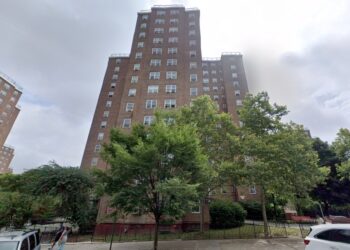A real estate fraudster accused of conniving his way into owning a Harlem brownstone now worth $2 million is asking a court to recognize him as the legal owner of the allegedly pilfered property — while its elderly owner cannot be found.
In 2012, Joseph Makhani targeted a dilapidated three-story house on West 118th Street, while its owner collected cans in the street, according to authorities and neighbors.
Makhani, 60, is accused of using forged deeds and other fraudulent paperwork to take the home — claiming to offer owner Veronica Palmer a mere $10 she never even got.
The home, which the developer renovated and converted into apartments, now generates about $12,000 a month in rent.
Makhani was hit with a seven-count indictment in July 2021 by state Attorney General Letitia James, accused of mortgage fraud and ripping off homeowners such as Palmer, now 81.
But he was never convicted, and now he is doubling down, claiming in new court papers that one of his companies has had “continuous” control of 107 West 118th Street for more than a decade.


The only person who can challenge Makhani’s claim to the building is Palmer, according to the lawsuit.
“This action is brought … to establish [Makhani’s] one hundred (100%) percent ownership” of the building, the developer said in paperwork filed against Palmer by North Harlem LLC, the Makhani company which controls 107 West 118th Street.
He used boilerplate legal language in the court papers, declaring Palmer “is not an infant, mentally ill or an alcohol abuser.” He listed her home address as Magnolia House in Brownsville, a shelter the city says is “for single women who are dually diagnosed with mental illness and substance abuse.”

Sources said she is no longer there and cannot be found.
Palmer’s younger brother believes the former city Corrections officer has been mentally ill for decades.
“We’re concerned about Ronnie and finding her,” John Jackson told The Post, adding his sister would never have agreed to sell her brownstone and once refused to give him control of the property so he could make repairs.
She repeatedly rejected help from family and mental health professionals, even when she was living without heat, hot water, or electricity, said Jackson, 78, who last spoke to Palmer on a brief phone call a few years ago, after finding her at a Brooklyn homeless shelter.
Just last month she sent a gift to their siblings — writing the address of her lost brownstone on the package, he said.
Without a criminal case against him, there’s nothing stopping Makhani from using the courts to solidify his hold on Palmer’s home.
“If I’m Joe Makhani that’s exactly what I’d do and I can’t do it quickly enough,” Brooklyn lawyer Toby Cohen, who reps clients trying to reclaim stolen properties, said of Makhani’s latest court filing. “Unless and until charges are brought, and a conviction is put in, he needs to make hay while the sun shines.”
If Palmer fails to respond to the newest legal filing, a judge will likely award the developer a default judgment.


The failed mortgage fraud case against Makhani isn’t his first brush with the law.
In 1998, Makhani and his brother were among 25 real estate brokers who pleaded guilty to a massive bid-rigging scheme on foreclosed properties in Queens.
Though the Attorney General’s indictment of Makhani was tossed on a technicality, in April the state appellate court’s First Division gave a green light for the AG to resubmit the case to a grand jury, court records show.
A spokesperson for the AG didn’t respond to questions about the case.
A lawyer for Makhani did not respond to messages.



























